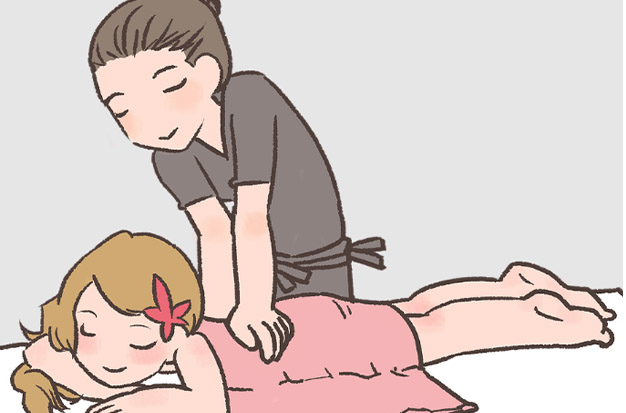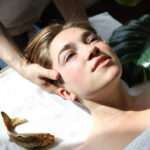Sore After Massage – Is It Normal to Get Pain After a Massage?

It’s common to feel sore or tight muscles after a massage, especially if it’s been a while or if you’ve never gotten one before.
Not exactly what you would want after receiving a massage is pain. Despite the fact that the massage and the days that follow should leave you feeling fantastic physically. Most people report feeling more energized, assured, relaxed, looser, and flexible, and their pain usually disappears.
How Does A Massage Operate?
Massage is similar to exercise: Your muscles are forced to receive blood, which brings nutrients and flushes out toxins. This procedure can momentarily worsen inflammation (the body’s attempt to heal the injured area). This swelling may make you feel uncomfortable.
A few hours to a day and a half is the typical duration of inflammation and discomfort. The same remedies you use to soothe sore muscles after working out may also help soothe soreness following a massage.
Effective massage doesn’t have to hurt. Many massage therapists have received training in a variety of pressure and timing-based techniques. Please speak up if a technique doesn’t feel therapeutic to you and instead just feels painful. We are able to change things. We might be able to identify a problem area, but we cannot detect how intensely you are responding to pain.
You have an appointment at the spa for an hour or two to receive a full-body massage. You take off your robe, the lights are dimmed, and you lay flat on the massage bed. As the masseuse’s skilled hands work to relax your tense muscles, before you know it, you’ve fallen asleep.
After receiving the massage of your dreams, you awoke the next morning feeling incredibly sore, as if you had just returned from a strenuous gym session rather than a purportedly relaxing spa visit. All you needed was a short break to rest, recharge, and refresh. You weren’t expecting the sore fest that would follow.
Why Does It Sometimes Hurt After A Massage?
Remain calm because this is not an unusual circumstance. The soreness and fatigue that follow a massage are so common that it is considered normal. Numerous elements contribute to why it occurs. Perhaps it’s because you selected a deep tissue massage. Or perhaps it’s been a while since you had one. Before and after the message, you didn’t hydrate yourself enough. Or you may be attending a professional session for the very first time.
There’s no need to panic because if the massage was mild and bearable, the swelling and pain would subside after a day and a half. You should hydrate well, get enough rest, and eat a snack right away after the massage to help the soreness from the massage subside more quickly.
Your post-massage soreness is not a good sign, unfortunately, in other circumstances as well. It might have been brought on by a specialist with subpar techniques or a massage therapist with insufficient experience. It did more harm than good to your body because they used too much pressure and kneading to get the twisted muscle knots to loosen up. This implies that your body won’t be eliminating any toxins. Your kidneys would suffer damage as a result of the substances that leaked from your decomposed muscles being circulated.
Soreness does not necessarily indicate that a massage was beneficial to your health. It may be sore as a result of rhabdomyolysis, a serious muscle crush injury that is caused by strenuous exercise and which explains why intense workouts cause people to experience similar symptoms to those of massage.

What Makes Me Sore After A Deep Tissue Massage?
If you experience muscle soreness after receiving a massage, this is likely due to the soft tissues’ manipulation, which broke down adhesions, knots, and holding patterns to return the condition of your muscles to a functional state. Muscle groups and tissue can tangle and require firm pressure to be applied during a massage in order to coax them back into a relaxed, untwisted state. A deeper level of challenge is typically required to get a chronic or stubborn condition moving. The soft tissues can experience the effects of “good hurt” by becoming sore and needing time to heal the resulting mini traumas, just like with a strenuous exercise workout.
Read More:What Is the Difference Between Thai Massage & Deep Tissue?
Why Are There Massages That Hurt?
Each person’s body is different, and every massage treatment is different depending on that. You are extremely unlikely to feel sore after a light, soothing procedure like a Swedish massage. Regular recipients of Deep Tissue, Sports, and Remedial massage often report little to no after-effects, whereas a non-regular recipient who uses massage to treat muscle pain, an injury, or a chronic condition may feel very uncomfortable. “Your remedial massage therapist’s job is to challenge your soft tissues because pain is the body’s resistance to change. This is referred to as the therapeutic edge of “good hurt,” where release can occur by encouraging change as opposed to coercing it. Some massage therapists can apply the right speed, depth, and pressure direction because they have a better sense of the therapeutic edge. When compared to how they typically feel after receiving a massage, clients occasionally respond differently due to environmental and chemical factors like stress, diet, and a woman’s period.
What To Do When You Feel Sore After A Massage
Cooldown stretch after your massage
You need to cool down after your massage, just like you would after a hard workout. Your body can already feel better from soreness with a gentle stretch. Your body’s flexibility, blood circulation, and muscle tension will all be relieved. Not only will it lessen the pain, but it can also help you feel less stressed and have a clearer mind.
Take a hot shower or a sauna
Relaxation is encouraged by body warming. Baking soda or Epsom salt are suggested for a hot bath by Healthline. Spend up to 30 minutes soaking in it for heat therapy. If you don’t have a heating pad, a hot rice bag can be applied gently to any painful area for 15 minutes as a substitute.
Drink lots of water
Drink plenty of water both before and after your massage. Toxins that surfaced during your massage would be helped to flush out by the water in your system. Do not consume any caffeinated beverages, including alcohol, soda, coffee, or any other. You can hydrate yourself with coconut water, fruit or vegetable juice, a cup of herbal tea, or another beverage aside from water.
Conclusion
The term “muscle guarding” describes how our brain reacts when we feel pain, ache, or soreness after receiving a massage. It is the unconsciously tensed muscles that are tense to guard the sore area. Unfortunately, doing so negates the positive effects of the massage and starts a new, sometimes worse, pain cycle because the sore muscles that are currently healing are now required to work nonstop.
A massage is much more than a luxuriant experience or indulgent self-pampering because of all the advantages it has for the body and mind. You should go as often as you can afford to because even a session once every few months with a pro is completely worthwhile.
Tags: Get Pain After Massage, Sore After Massage








